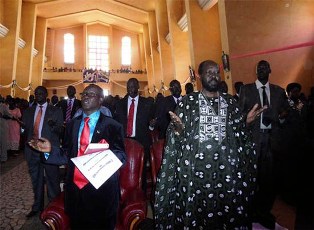S. Sudan president calls on churches to disseminate peace messages
December 27, 2015 (JUBA) – South Sudanese president, Salva Kiir, has called on churches and other faith based organizations and members of the civil society as well as members of general public to help his government disseminate messages of peace, reconciliation and forgiveness as he implements the peace deal which he signed in August with leader of armed opposition faction of the Sudan People’s Liberation Movement (SPLM-IO), Riek Machar, and other stakeholders.

“I have said it in many occasions, including in my recent address to the parliament that it is time to prepare our people to work for peace and reconciliation. I asked them to welcome the members of the advance [team] of the SPLM-IO [Sudan People’s Liberation Movement in Opposition] even if you have lost something as a result of this war. We should try to forgive and reconcile,” said Kiir in a message broadcast by the state-run South Sudan Television on Saturday.
“The work of peace building and reconciliation requires all of us to work together. The advance team of our brothers and sisters in the SPLM-IO has met with me and I assured them of the commitment of the government and my personal commitment to do whatever we can do to implement this peace agreement in order for us to return the country back to normal. They have come to stay. They will not return. Taban Deng Gai told me Riek Machar will join them,” he said.
Sources close to the president’s meetings with the opposition delegation said Kiir wanted the opposition leader, Machar, to simply return soon to Juba and take part in the process without necessarily having to complete implementation of the requirements needed first for his return. These provisions in the agreement included, among others, constitutional amendment, withdrawal of forces from Juba and deployment of joint integrated forces in the capital.
However, under normal circumstances, Machar would only return when all other provisions are ready for formation of the transitional government of national unity which is supposed to be established by 22 January, according to a timetable put forth by the chairman of the Joint Monitoring and Evaluation Commission (JMEC), a body established to oversee the implementation of the peace deal.
He appealed for support from the church to sensitize the people and disseminate peace messages.
President Kiir however declined to make a comment on dissolution of the constitutionally recognized 10 and creation of 28 states as well as his presidential order appointing governors on Christmas Eve, a move condemned by the opposition groups as violation of the peace deal.
Episcopal Church archbishop, Daniel Deng Bul, in another prayer service marking the festival encouraged people to work for peace and announced the church would do her best to sensitize the people.
“We are going to talk about peace and how we are going to help in disseminating the peace that has been signed, because we feel it’s our obligation to mobilize our people towards peace and it’s a responsibility of every bishop that we work for peace and towards peace,” he said.
He added: “We are going to plan what type of mobilization to carry out in explaining the situation to our people and how to welcome our brothers who are coming from the SPLM in Opposition.
He appealed for peaceful approach in the country, warning that without it the nation will not move forward in restoring stability.
The religious leader further added that the church was tasked with the mandate of peace under the responsibility of every bishop. He emphasized there was an urgent need for reconciliation among wounded communities.
“Without peace actually there would be nothing that could grow, so our first priority is to work hard to bring peace to the country, educate our people and development and other things will follow,” he stressed.
Roman Catholic church archbishop, Paulino Lukudu, said the only reward the leaders could give to the people of South Sudan was to fully implement the peace agreement signed in August as the way to end the suffering and unite the people.
(ST)
